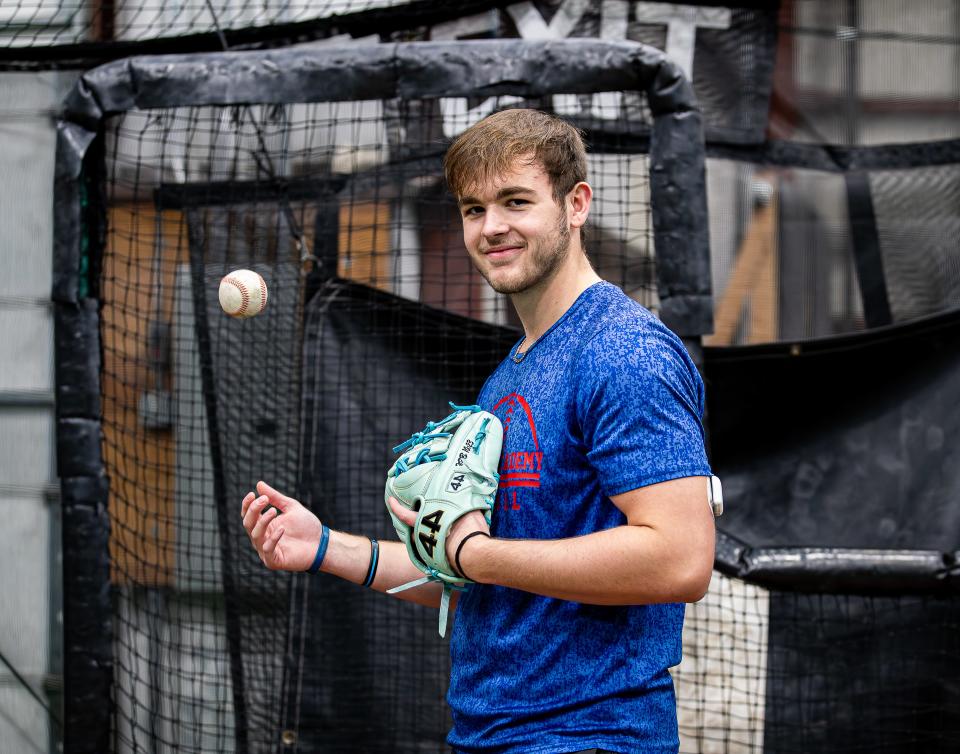Christian Academy baseball standout Nathan King isn't letting diabetes derail his dreams

Christian Academy's Nathan King, now a senior at the school, was diagnosed with Type 1 diabetes when he was in seventh grade.
"It's super scary when you start out. I mean, nobody wants to hear that their child has a chronic disease. It's like a punch in the gut," said Nathan's mom, Trina King.
Diabetes once was considered a death sentence, but new breakthroughs in medicine and tech have allowed athletes, including former Louisville baseball player Adam Duvall and Baltimore Ravens tight end Mark Andrews, to continue to thrive.
Type 1 diabetes attacks certain cells in the pancreas, and as a result, it causes deficient insulin production.
"About 5-10% of people with diabetes have type 1. Currently, no one knows how to prevent type 1 diabetes, but it can be treated successfully," according to the CDC.
Nathan was the first one in his family to be diagnosed with diabetes, so the initial diagnosis was nerve-wracking for them.

"I've never given anybody a shot before. And when you start out, you've got all these calculations of, what did he eat, when is he eating and how much insulin is he getting? You're scared to death that you're going to give him too much or not enough," Trina King said. "It was pretty overwhelming."
As a middle schooler, Nathan's first question was, "Can I still play baseball?"
Shortly after his diagnosis, Nathan started going to the Wendy Novak Diabetes Institute, which helped him find the most efficient ways to handle his diagnosis and continue to play sports.
Brad Thrasher, a pediatric endocrinologist and director of the Christensen Family Sports & Activity Program, and his staff helped Nathan get accustomed to consistently monitoring his blood sugar, counting calories and taking insulin shots.
Families come in, meet with an exercise physiologist, and have the patient undergo a series of tests to measure body metrics and exercises that measure their cardio-respiratory fitness.
The doctors create a workout plan that the athletes can complete at home or with their coaches.
"Whoever participates in activities can get really big swings in their blood sugar. The biggest fear is if we go low because we have low blood sugar, it can lead to seizures, potentially coma, even death if we get too low," Thrasher said. "If you're staying too high for too long, you might not be performing at your best level."
Dietitians help patients, including Nathan, monitor their nutrition. Patients keep a food journal, documenting what they eat at least three times a week.
Nathan wears an Omnipod, which delivers insulin directly to his body. He also has a Dexcom device, which alerts him of his blood sugar levels and is connected to an app on his phone.

"Those two things have been complete game-changers because they've completely cut out shots and finger pricks, and it's made my life — and I know my mom's life — a whole lot easier," Nathan said.
Nathan said his biggest thing is not allowing diabetes to define him.
"It's not who you are. It's a part of you. It's something that I have to deal with every single day. It doesn't stop me from doing anything. It doesn't inhibit my abilities at all."
Last year, King earned a spot on The Courier Journal's all-region baseball team. He led CAL in home runs and was second in batting average and hits.
King ended March hitting .500 in nine games, with 16 RBIs and three home runs.
"A lot of people think, 'Man, all these kids get diabetes because they ate a Snickers bar or drank Coca-Cola.' I'd say that's not the case for these kids living with Type 1; it's just an unfortunate event that happened, but nothing that they did to cause diabetes for themselves," Thrasher said.
"To reiterate, these kids can go on to do whatever they want to do, whether it is to play at a professional level or work in another profession."
Reach sports reporter Prince James Story at pstory@gannett.com and follow him on X at @PrinceJStory.
This article originally appeared on Louisville Courier Journal: Christian Academy baseball star isn't letting diabetes derail dreams

